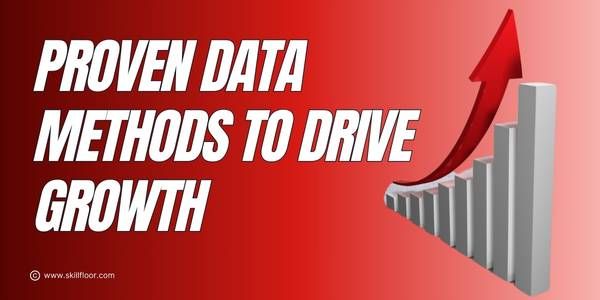Data Analytics in Retail: Personalizing Customer Experiences for Success
Elevate your retail strategy with Data Analytics. Learn to personalize customer experiences for unprecedented success.

In the world of retail, data analytics has emerged as a transformative force. Its importance cannot be overstated, as it empowers retailers to glean valuable insights from vast pools of data. At the heart of this transformation lies the concept of personalized customer experiences, a key driver of success in today's competitive landscape. This introduction sets the stage for exploring how data analytics revolutionizes retail by enabling businesses to understand, engage, and cater to their customers on an individual level, ultimately driving growth and loyalty.
Data Analytics in Retail
In the retail industry, data analytics leverages various types of data to derive meaningful insights. This includes transaction data, customer demographics, online behavior, and social media interactions. By collecting and analyzing this diverse range of data, retailers can gain a holistic view of their customers and operations, allowing for informed decision-making.
Retailers employ a multitude of tools and technologies to conduct data analysis effectively. This encompasses data warehousing, business intelligence software, data visualization tools, and advanced analytics platforms. These tools enable retailers to process and interpret large datasets, facilitating trend identification and actionable insights.
The adoption of data analytics in retail yields numerous advantages. Retailers can optimize inventory management, improve demand forecasting, enhance pricing strategies, and personalize marketing efforts. Furthermore, data analytics empowers retailers to enhance customer experiences by tailoring product recommendations and promotions, ultimately leading to increased sales and customer satisfaction.
Customer Personalization
Customer personalization in retail involves tailoring shopping experiences to individual preferences and behaviors. It utilizes data analytics to understand and predict customer needs, ultimately providing a customized journey.
The benefits of personalized shopping experiences are significant. They enhance customer satisfaction and loyalty by making shoppers feel valued. Personalization also boosts sales, as tailored recommendations and promotions increase the likelihood of purchases.
Successful personalization in retail can be seen in various forms. Amazon's product recommendations based on past purchases and browsing history, Starbucks' mobile app that suggests personalized drink options, and clothing brands sending personalized style recommendations via email are all prime examples of effective customer personalization strategies.
Data Collection and Management
In the realm of data analytics in retail, the collection and management of customer data hold paramount importance. Retailers must tread responsibly in this arena, ensuring the highest standards of data ethics and privacy.
Collecting Customer Data Responsibly
Successful data analytics begins with responsible data collection. Retailers should gather information through transparent and ethical means, obtaining customer consent where necessary. This process involves acquiring various types of data, such as purchase history, online behavior, and demographic information, to build a comprehensive understanding of their customers.
Storing and Securing Customer Data
Once collected, customer data must be stored securely. Retailers need robust data storage systems and security protocols to safeguard this sensitive information. Implementing encryption, access controls, and regular security audits is essential in preventing data breaches and maintaining customer trust.
Complying with Data Privacy Regulations (e.g., GDPR, CCPA)
Retailers must diligently adhere to data privacy regulations, such as the General Data Protection Regulation (GDPR) and the California Consumer Privacy Act (CCPA). Compliance involves transparency in data collection practices, allowing customers to access and control their data, and promptly responding to data-related requests or breaches. Non-compliance can result in severe legal and reputational consequences, making adherence imperative for retail success.
Effective data collection and management not only ensure compliance but also build the foundation for accurate and insightful data analytics, ultimately contributing to personalized customer experiences and retail success.
Leveraging Data Analytics
Data Analytics Tools and Techniques in Retail:
Data analytics has emerged as a game-changer. Retailers harness the power of data analytics tools and techniques to gain invaluable insights into their operations, customer preferences, and market trends. These tools collect, process, and analyze vast amounts of data, including sales figures, customer demographics, inventory levels, and even weather patterns. By doing so, retailers can optimize their supply chains, manage inventory efficiently, and enhance the overall customer experience. Moreover, data analytics enables retailers to identify patterns, anomalies, and trends, allowing them to make informed decisions in real-time and adapt to changing market conditions swiftly.
Predictive Analytics for Understanding Customer Behavior:
One of the most significant applications of data analytics in retail is predictive analytics, which provides a deeper understanding of customer behavior. By analyzing historical data, retailers can predict future customer actions and preferences. For instance, predictive analytics can forecast which products customers are likely to buy, the optimal pricing strategy, and even the most effective marketing channels. This valuable information empowers retailers to tailor their offerings, promotions, and marketing campaigns to meet customer expectations effectively. By anticipating customer needs, retailers can enhance customer satisfaction, increase sales, and foster long-term loyalty.
Segmenting Customers for Targeted Marketing:
Segmentation is a critical strategy in retail, and data analytics plays a pivotal role in this process. Retailers use data-driven segmentation techniques to categorize their customer base into distinct groups based on various criteria, such as demographics, purchase history, and behavior. This segmentation allows retailers to create highly targeted marketing campaigns tailored to each group's specific preferences and needs. By delivering personalized promotions and recommendations, retailers can boost conversion rates and customer engagement. Segmenting customers also helps in optimizing inventory management by tailoring product assortments to the preferences of each segment, ultimately maximizing sales and profitability.
Challenges and Considerations
In the data analytics in the retail sector, several significant challenges and considerations loom large. Firstly, data security and privacy have become paramount concerns as retailers collect vast amounts of customer information. Ensuring compliance with ever-evolving data protection regulations like GDPR and CCPA is a constant challenge. Secondly, the sheer volume of data generated from various sources, such as point-of-sale systems, online transactions, and social media, can be overwhelming. Retailers must grapple with the complexity of integrating and analyzing these diverse datasets effectively. Thirdly, the need for real-time analytics to meet customer demands and optimize inventory poses a significant technological hurdle. Scaling up infrastructure and adopting advanced analytics tools to handle this demand is no small feat. Finally, interpreting data accurately to make informed decisions remains a critical consideration. Retailers must invest in skilled data analysts and data scientists who can extract meaningful insights from the data flood and translate them into actionable strategies to stay competitive in this ever-evolving industry.
Tools and Technologies
Data analytics has become an indispensable asset in the retail sector, empowering businesses to make informed decisions and gain a competitive edge. Several tools and technologies have emerged as crucial components of this transformative journey. Advanced analytics platforms like Tableau and Power BI enable retailers to visualize and interpret their data, uncovering valuable insights into customer behavior, inventory management, and sales trends. Machine learning algorithms, supported by libraries such as TensorFlow and scikit-learn, are employed to develop predictive models for demand forecasting, price optimization, and personalized marketing campaigns. Moreover, the integration of Big Data frameworks like Hadoop and Spark allows retailers to efficiently process and analyze vast amounts of data from various sources, including online transactions, social media, and IoT devices. In essence, these tools and technologies are revolutionizing data-driven decision-making in the retail industry, leading to improved customer experiences and operational efficiencies.
Future Trends
Emerging trends in data analytics for retail:
As the retail landscape continues to evolve, data analytics is poised to play an increasingly pivotal role. Retailers are harnessing the power of big data and advanced analytics to gain deep insights into consumer behavior, preferences, and trends. Predictive analytics and machine learning are being used to forecast demand, optimize pricing strategies, and improve inventory management. Moreover, real-time data analytics allows retailers to make informed decisions on the fly, ensuring seamless customer experiences and operational efficiency. As data analytics tools and techniques continue to advance, retailers are likely to see even more opportunities to personalize their offerings, streamline operations, and ultimately thrive in the highly competitive market.
The impact of augmented reality and virtual reality:
Augmented reality (AR) and virtual reality (VR) are revolutionizing the retail industry by creating immersive and interactive shopping experiences. AR apps enable customers to visualize products in their own environments before making a purchase, enhancing their confidence and reducing the likelihood of returns. VR, on the other hand, offers virtual showrooms and stores where customers can explore products as if they were physically present. These technologies are blurring the lines between online and brick-and-mortar shopping, providing retailers with innovative ways to engage consumers. In the future, AR and VR are expected to become even more integral to the retail experience, offering new avenues for advertising, product demonstrations, and customer engagement.
The role of IoT in enhancing personalization:
The Internet of Things (IoT) is transforming personalization in the retail sector. IoT devices, such as smart shelves, beacons, and wearable technology, are collecting vast amounts of real-time data on customer behavior and preferences. This data is being leveraged to create hyper-personalized shopping experiences. For instance, smart mirrors in dressing rooms can suggest complementary items based on what the customer is trying on, and beacons can send tailored promotions to shoppers as they browse in-store. Additionally, IoT enables retailers to optimize inventory management by monitoring stock levels and tracking product movement throughout the supply chain. As IoT technology continues to mature, retailers will have even greater capabilities to anticipate and meet customer needs, ultimately driving customer loyalty and sales.
These emerging trends in data analytics, augmented reality, virtual reality, and IoT are reshaping the retail landscape. Retailers who embrace these technologies and adapt to the changing consumer expectations are likely to thrive in the evolving market.
Data analytics has emerged as a paramount tool in the retail industry for personalizing customer experiences. This recapitulation underscores the profound impact that harnessing data can have on enhancing customer satisfaction and driving business growth. It is imperative for retailers to wholeheartedly embrace data-driven strategies, recognizing them as not just an option but a necessity in the highly competitive landscape. By leveraging data analytics, retailers can gain valuable insights into customer preferences, behaviors, and trends, enabling them to tailor their offerings and marketing efforts more effectively. As we look to the future, personalization in retail is poised to continue evolving, with advancements in technology and data analytics playing a central role. Retailers who embrace these innovations stand to thrive, fostering stronger connections with their customers and ultimately achieving sustainable success in an ever-changing marketplace.





























































